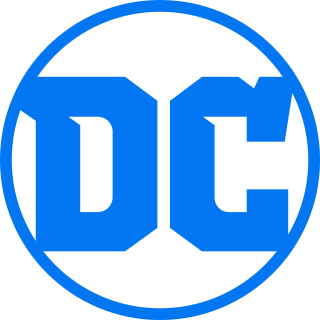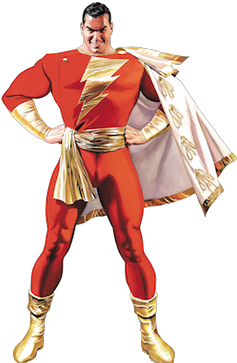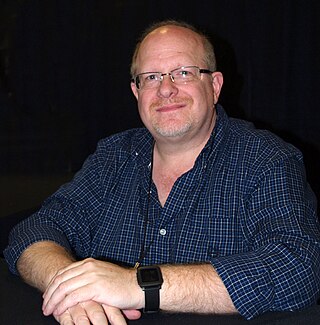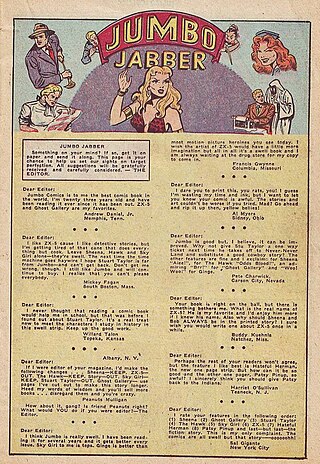
DC Comics, Inc. is an American comic book publisher and the flagship unit of DC Entertainment, a subsidiary of Warner Bros. Discovery.

The Justice League, or Justice League of America (JLA), is a team of superheroes appearing in American comic books published by DC Comics. The team first appeared in The Brave and the Bold #28. The team was conceived by writer Gardner Fox as a revival of the Justice Society of America, a similar team from DC Comics from the 1940s which had been pulled out of print due to a decline in sales.
Thor, the god of Norse mythology, has appeared as a character in various comics over the years, appearing in series from a range of publishers.
The mythological hero Hercules or Heracles appears in several comics.

Captain Marvel, also known as Shazam and the Captain, is a superhero in American comic books originally published by Fawcett Comics and currently published by DC Comics. Artist C. C. Beck and writer Bill Parker created the character in 1939. Captain Marvel first appeared in Whiz Comics #2, published by Fawcett Comics. He is the alter ego of Billy Batson, a boy who, by speaking the magic word "SHAZAM!", is transformed into a costumed adult with the powers of superhuman strength, speed, flight, and other abilities. The character battles an extensive rogues' gallery, most of them working in tandem as the Monster Society of Evil, including primary archenemies Black Adam, Doctor Sivana and Mister Mind. Billy often shares his powers with other children, primarily his sister Mary Batson and their best friend/foster brother Freddy Freeman, who also transform into superheroes and fight crime with Billy as members of the Marvel Family, also known as the Shazam Family.

Timely Comics is the common name for the group of corporations that was the earliest comic book arm of American publisher Martin Goodman, and the entity that would evolve by the 1960s to become Marvel Comics.

Mark Bagley is an American comics artist. He has worked for Marvel Comics on such titles as The Amazing Spider-Man, Thunderbolts, New Warriors, Venom and Ultimate Spider-Man and for DC Comics on Justice League of America, Batman, and Trinity.

Marvel Team-Up is an American comic book series published by Marvel Comics. The series featured two or more Marvel characters in one story. The series was originally published from March 1972 through February 1985, and featured Spider-Man as the lead "team-up" character in all but ten of its 150 issues, and in six of its seven Annuals. It was the first major ongoing spin-off series for Spider-Man, being preceded only by the short-lived The Spectacular Spider-Man magazine. Of the issues that did not star Spider-Man, the Human Torch headlines six issues ; the Hulk, four ; and Aunt May, one (#137). Publication of most of the issues starring the Human Torch coincided with that of Giant-Size Spider-Man, an alternate Spider-Man "team-up"-themed series by the regular Marvel Team-Up creative team. When cancelled with #150 in 1985, the title was replaced by Web of Spider-Man.

Roger Stern is an American comic book author and novelist.

Mark Waid is an American comic book writer best known for his work on DC Comics titles The Flash, Kingdom Come and Superman: Birthright as well as his work on Captain America, Fantastic Four and Daredevil for Marvel. Other comics publishers he has done work for include Fantagraphics, Event, Top Cow, Dynamite, and Archie Comics.

The Marvel Family, also known as the Shazam Family, are a group of superheroes who originally appeared in books published by Fawcett Comics and were later acquired by DC Comics. Created in 1942 by writer Otto Binder and artist Marc Swayze, the team was created as an extension of Fawcett's Captain Marvel franchise, and included Marvel's sister Mary Marvel, their friend Captain Marvel Jr., and, at various times, a number of other characters as well.
Bucky is the name used by several different fictional characters appearing in American comic books published by Marvel Comics, usually as a sidekick to Captain America. The original version was created by Joe Simon and Jack Kirby and first appeared in Captain America Comics #1, which was published by Marvel's predecessor, Timely Comics. Following the apparent death of the hero James "Bucky" Barnes, the Bucky nickname and costume have been used by various heroes including: Fred Davis, Jack Monroe, Rick Jones, Lemar Hoskins, and Rikki Barnes. For a time, a child looked after by Jack Monroe was named "Bucky," but she was later adopted and given the name Julia Winters.
Young Allies is the name of three superhero teams appearing in American comic books published by Marvel Comics.

JLA/Avengers is a comic book limited series and crossover published in prestige format by DC Comics and Marvel Comics from September 2003 to March 2004. The series was written by Kurt Busiek, with art by George Pérez. The series features the two companies' teams of superheroes, DC Comics' Justice League of America and Marvel's Avengers.
Kid Colt is the name of two fictional characters appearing in American comic books published by Marvel Comics. The first is a cowboy whose adventures have taken place in numerous western-themed comic book series published by Marvel. The second is a cowboy-themed horse-like superhero. The character's first appearance was in Kid Colt #1.

Arvell Jones is an American comics artist best known for his work for Marvel Comics and for DC Comics and its imprint Milestone Media.
The Alley Award was an American annual series of comic book fan awards, first presented in 1962 for comics published in 1961. Officially organized under the aegis of the Academy of Comic Book Arts and Sciences, the award shared close ties with the fanzine Alter Ego magazine. The Alley is the first known comic book fan award.
In the field of comic books, a limited series is a comics series with a predetermined number of issues. A limited series differs from an ongoing series in that the number of issues is finite and determined before production, and it differs from a one shot in that it is composed of multiple issues. The term is often used interchangeably with miniseries (mini-series) and maxiseries (maxi-series), usually depending on the length and number of issues. In Dark Horse Comics' definition of a limited series, "this term primarily applies to a connected series of individual comic books. A limited series refers to a comic book series with a clear beginning, middle and end". Dark Horse Comics and DC Comics refer to limited series of two to eleven issues as miniseries and series of twelve issues or more as maxiseries, but other publishers alternate terms.

Father Time is a fictional superhero appearing in American comic books published by Marvel Comics. The character was created by writer Stan Lee and artist Al Avison and first appeared in Captain America Comics #6, published by Marvel predecessor Timely Comics during the period fans and historians call the Golden Age of comic books. He was one of the many costumed operatives who were recruited into the United States military.

A comic book letter column is a section of an American comic book where readers' letters to the publisher appear. Comic book letter columns are also commonly referred to as letter columns, letter pages, letters of comment (LOCs), or simply letters to the editor. Letter columns appeared early on in the history of comic books themselves, and their growing prevalence — particularly beginning in the 1960s — helped create and legitimatize comics fandom. As the forum developed, the volume and tenor of letters became a reliable gauge of overall reader response to developments in the comics themselves. Letter columns remained a regular feature of most comic books until the early years of the 21st century, when they began being phased out in favor of the growing prevalence of email and Internet forums. Despite this, the 2010s saw a renaissance of comic book letter columns, and many comics titles still print them.












